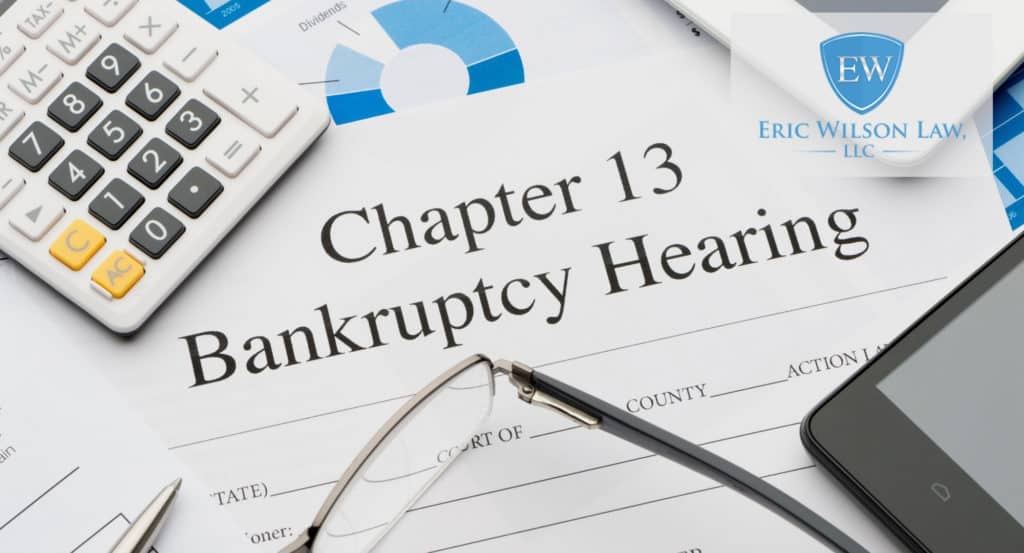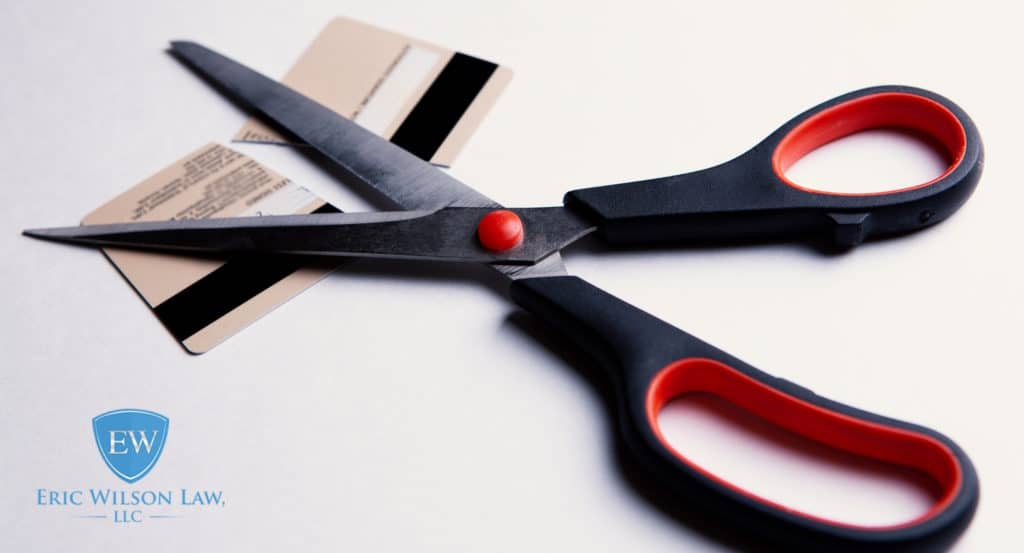Home » Practice Areas » Chapter 13 Lawyer in Tuscaloosa, AL

If you have too much debt but also too much disposable income to file for Chapter 7 bankruptcy, Chapter 13 is the answer. Chapter 13 bankruptcy reorganizes secured debts into a manageable debt repayment plan while allowing you to either erase or repay unsecured debt at no interest. A skilled Tuscaloosa Chapter 13 lawyer can help you with debt management through a bankruptcy filing.
At Eric M. Wilson, LLC, we represent a wide variety of individuals and families throughout the Tuscaloosa, Alabama area in all matters of bankruptcy. We can help you develop a repayment plan that fits within your means. Call 205-349-1280 for a free evaluation.
What is Chapter 13 Bankruptcy?
Chapter 13 bankruptcy, also known as reorganization bankruptcy, is one of 6 chapters in the bankruptcy code that help people achieve a debt-free life. Chapter 13 is the second most commonly filed chapter of bankruptcy behind Chapter 7. In fact, there were 117,784 Chapter 13 filings in 2021 according to data from U.S. Courts.
Chapter 13 vs. Chapter 7
Unlike Chapter 7 bankruptcy, Chapter 13 reorganizes all qualifying debts into a manageable payment plan to be paid off in monthly installments over three to five years. So filers generally don’t have to sell their personal property in order to pay off their total debt as they have to in Chapter 7. A Chapter 13 repayment plan can wipe out the debts listed below.
- Credit card debt
- Medical bills
- Personal loan debt
- Unpaid income taxes
- Past-due mortgage payments
- Other unsecured debts
Instead of paying each individual creditor, you pay directly to the bankruptcy trustee, who distributes the payment to each creditor named in the plan. Once the payment period is complete, all remaining debt in the plan is completely discharged.
How Does Chapter 13 Bankruptcy Work?
The Chapter 13 bankruptcy process takes much longer than Chapter 7. At times, it can even be more confusing. So before you file, it’s good to be aware of the Chapter 13 bankruptcy basics.
Step One: Credit Counseling
The first thing you have to do before a bankruptcy filing is take a financial management course such as debt counseling or credit counseling. This course teaches bankrupt people how to successfully manage their money and avoid future bankruptcy filings.
Step Two: File Bankruptcy
Next, you’ll fill out your bankruptcy petition, pay a filing fee, submit financial documents, and begin your case. Shortly after, the bankruptcy court will notify you and your creditors of an automatic stay. An automatic stay basically stops all creditor harassment and collections while you focus on debt relief. Additionally, this notification from the bankruptcy court will include the date and time of the mandatory 341 meeting of creditors.
Step Three: 341 Meeting of Creditors
Every debtor who’s filing bankruptcy must attend a 341 meeting of creditors with a bankruptcy judge. Secured and unsecured creditors are invited to attend the meeting, but many times they don’t. The point of the meeting is to go over your current financial affairs and your bankruptcy petition. Additionally, the bankruptcy trustee and judge will make sure you’re not committing fraud. During this meeting, you’ll also turn in your 521 documents, which basically include:
- Two years’ worth of tax returns,
- Two months’ worth of paychecks,
- And two months’ worth of bank statements.
You should bring other documents as well, just in case your trustee or court clerk asks for them. For example, it’s a good idea to bring divorce settlements, recent mortgage and car loan statements, and business profit/loss statements, if applicable to your situation.
Step Four: The Repayment Plan
A month after your filing date, you’ll start making monthly payments in order to pay off your priority, secured, and unsecured debts. You’ll pay creditors for approximately 3 to 5 years until you’re debt-free. During this time, you must show your creditors that you’re making your best effort to repay them by using your disposable income to pay unsecured debts. This is called the “best efforts” rule. The rule also requires you to keep up payments on your nonexempt property.
Everyone’s monthly payment will look different depending on their financial situation. But the best way to determine how much you’re going to pay is to add up all your debt and divide it by the number of months in your repayment period.
What if I Can’t Make Repayment Plan Payments?
Let’s say your regular income decreases somehow during your bankruptcy case, so you suddenly can’t afford your monthly payments. You’ll have a few options:
- Modify Your Payments: With the bankruptcy court’s permission, you can reduce the amount of disposable income that’s going towards your unsecured debts. If you can’t do that, you’ll have to sell your personal property in order to pay your creditors. This will reduce your best efforts rule obligations.
- Request a Hardship Discharge: Maybe you’re struggling to pay your monthly payments because you just lost your job or because you suddenly developed major health problems. If that’s the case, you might be able to request a hardship discharge, which means that your debt would be discharged earlier than usual. In order to qualify for an early discharge though, you must prove that you can’t complete your plan due to circumstances outside of your control. You must also prove that plan modification isn’t possible and that your unsecured creditors received the equivalent of what you would’ve paid in a Chapter 7 case.
- Switch to Chapter 7: Another option is switching to Chapter 7. The problem here is that you would certainly lose nonexempt property that you haven’t fully paid for yet. Your unsecured creditors won’t be satisfied unless they receive enough money to pay for your nonexempt property. If not, your trustee will be forced to sell the property and pay your creditors.
- Dismiss Your Chapter 13 Case: The last option is to dismiss your case altogether. You’ll still have to pay any outstanding debts plus interest from your Chapter 13 case.
Step Five: Chapter 13 Confirmation
Your creditors, your bankruptcy lawyer, and your bankruptcy trustee could reject your repayment plan for any reason. Additionally, a judge will have to answer the following questions about your plan at the confirmation hearing.
- Can the debtor afford the plan and fulfill the monthly payments?
- Is the debtor trying to manipulate the system at all, or did they create the plan in good faith with their attorney?
- Does the repayment plan abide by bankruptcy law and state law? In other words, will the debtor pay enough money to the creditors under the law?
Once everyone is on the same page about your repayment plan, the judge will confirm it and then you’ll begin paying your creditors.
Step Six: No More Debt!
Three to five years down the line, the majority of your unsecured and secured debt will be completely wiped out as long as you made all your payments. You must also stay current on alimony and child support and endure a debt counseling program in order to receive your Chapter 13 discharge. The only debts that will survive your bankruptcy proceeding are:
- Student loans
- Mortgages
- Fines from a criminal conviction or a DUI
- Debts from fraudulent activity
How Much Does it Cost to File for Chapter 13 Bankruptcy in Alabama?
In order to file for Chapter 13 in Alabama, you must pay a filing fee of $313 according to the state’s bankruptcy court, although this fee is generally included in your repayment plan. All other upfront costs, including attorney fees, are very minimal.
Am I a Good Candidate for Chapter 13 Bankruptcy?
Chapter 13 bankruptcy is ideal for those who have a lot of debt but failed the Chapter 7 means test because they had too much disposable income. But income isn’t the only qualification you must meet in order to file this chapter of bankruptcy. If you have too much debt, you may not be able to file. The debt limitations change every 3 years to account for consumer price index changes, but the limits as of April 2022 are listed below.
- Secured debt: $1,257,850
- Unsecured debt: $419,275
If your debt exceeds these numbers, you could file for Chapter 11 bankruptcy instead. Experienced bankruptcy lawyer, Eric Wilson, will help you figure out which chapter of bankruptcy is best for you.
Call Chapter 13 Lawyer Eric Wilson Today
Are you ready for a fresh start and a life of financial freedom? Our Tuscaloosa, AL law firm can help you get there with our debt relief options. Eric Wilson has been helping his clients achieve a debt-free life for more than 20 years. He can certainly help you too. To get started on your attorney-client relationship, call 205-349-1280 today.
We are a debt relief agency. We help people file for bankruptcy relief under the Bankruptcy Code.
The following language is required pursuant to Rule 7.2, Alabama Rules of Professional Conduct. No representation is made that the quality of legal services to be performed is greater than the quality of legal services performed by other lawyers. This website is designed for general information only. The information presented at this site should not be construed to be formal legal advice nor the formation of a lawyer/client relationship.
Practice Areas
Office Location
Eric M. Wilson, LLC
1902 8th St Tuscaloosa, AL 35401
205-708-2115
Tuscaloosa Law Office Map and Directions

